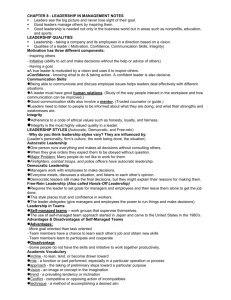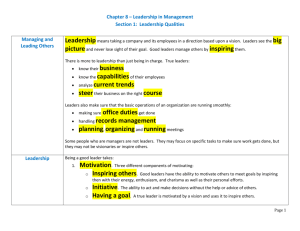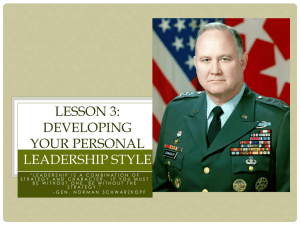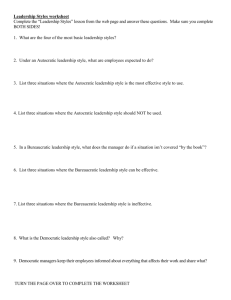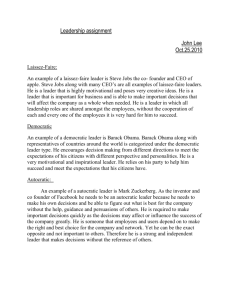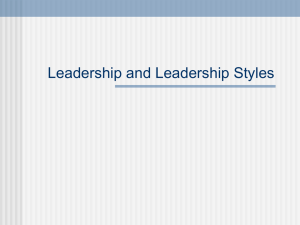Leadership in Management
advertisement
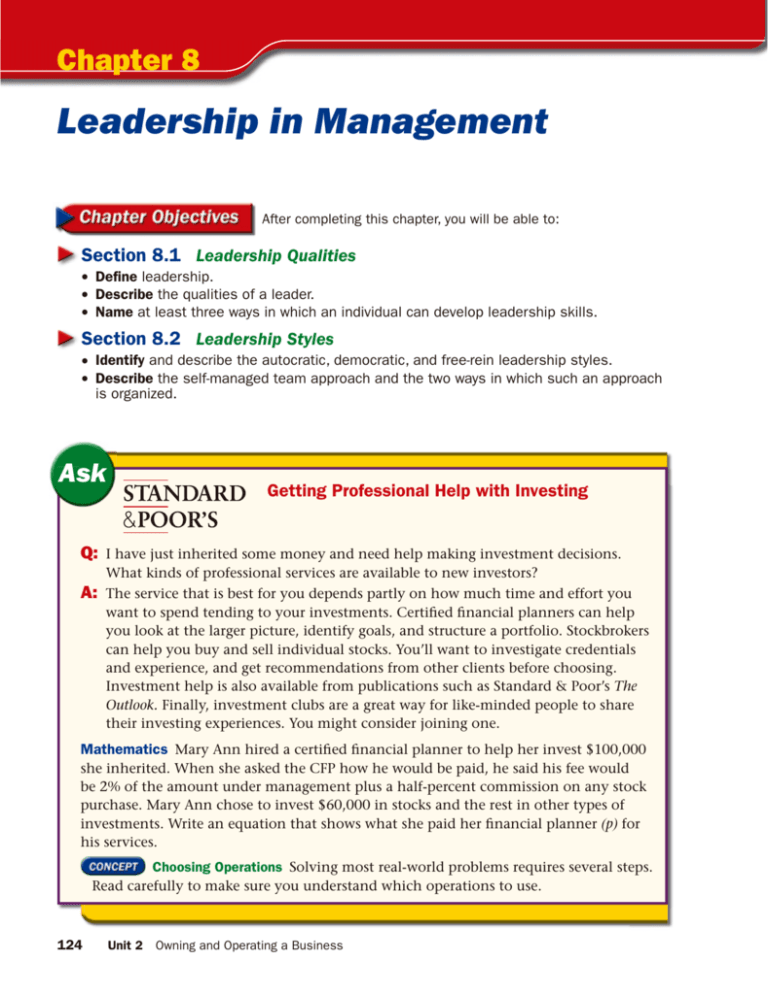
Chapter 8 Leadership in Management After completing this chapter, you will be able to: Section 8.1 Leadership Qualities • Define leadership. • Describe the qualities of a leader. • Name at least three ways in which an individual can develop leadership skills. Section 8.2 Leadership Styles • Identify and describe the autocratic, democratic, and free-rein leadership styles. • Describe the self-managed team approach and the two ways in which such an approach is organized. Ask Getting Professional Help with Investing Q: I have just inherited some money and need help making investment decisions. What kinds of professional services are available to new investors? A: The service that is best for you depends partly on how much time and effort you want to spend tending to your investments. Certified financial planners can help you look at the larger picture, identify goals, and structure a portfolio. Stockbrokers can help you buy and sell individual stocks. You’ll want to investigate credentials and experience, and get recommendations from other clients before choosing. Investment help is also available from publications such as Standard & Poor’s The Outlook. Finally, investment clubs are a great way for like-minded people to share their investing experiences. You might consider joining one. Mathematics Mary Ann hired a certified financial planner to help her invest $100,000 she inherited. When she asked the CFP how he would be paid, he said his fee would be 2% of the amount under management plus a half-percent commission on any stock purchase. Mary Ann chose to invest $60,000 in stocks and the rest in other types of investments. Write an equation that shows what she paid her financial planner (p) for his services. Choosing Operations Solving most real-world problems requires several steps. Read carefully to make sure you understand which operations to use. 124 Unit 2 Owning and Operating a Business Captain of the Team All kinds of groups need leaders. Why do you think it is good to have a leader? Chapter 8 Leadership in Management 125 Photo Photo Credit: Credit: Comstock/SuperStock vlkjdf;lkjeijeojf;ldkjl;dskfj; RF Section 8.1 Leadership Qualities Think about the essential qualities that make someone an effective leader. Read to Learn • Define leadership. • Describe the qualities of a leader. • Name at least three ways in which an individual can develop leadership skills. The Main Idea Leaders develop a vision for the organization that they are leading. They move employees and their organization toward that vision. The qualities of leaders include motivation, confidence, communication skills, and integrity. Academic Vocabulary You will find these words in your reading and on your tests. Make sure you know their meanings. vision conflict trends techniques Graphic Organizer List and define the qualities of a good leader in a figure like the one below. Key Concepts • Managing and Leading Others • Developing Leadership Skills Leadership Vocabulary Key Terms leadership initiative human relations integrity Go to the Introduction to Business Online Learning Center through glencoe.com for a printable graphic organizer. Academic Standards English Language Arts NCTE 1 Read texts to acquire new information NCTE 9 Develop an understanding of diversity in language use across cultures Mathematics Problem Solving Apply and adapt a variety of appropriate strategies to solve problems 126 Chapter 8 Leadership in Management glencoe.com Managing and Leading Others Leadership means taking a company and its employees in a direction based upon a vision. Leaders see the big picture and never lose sight of their goal. Good leaders manage others by inspiring them. There is more to leadership than just being in charge. In today’s world, true leaders know their business and the capabilities of their employees, analyze current trends, and steer their business on the right course. Some people who are managers are not leaders. They may focus on specific tasks to make sure work gets done, but they may not be visionaries or inspire others. Good leadership is needed not only in the business world but also in areas such as nonprofits, education, and sports. For example, a football team depends on its quarterback to call the signals and direct the offensive play. The quarterback has to think quickly and counts on his teammates to follow through after a decision is made. Ideally, the person in charge of a business or business team is also a leader. Leaders also make sure that the basic operations of an organization are running smoothly. That could involve making sure office duties get done; handling records management; and planning, organizing, and running meetings. Being a good leader takes several qualities. Motivation, confidence, communication skills, and integrity are among them. Think about some people you know who are managers. Identify What does leadership involve in today’s world? Total Quality Management After World War II, Japan had a reputation for producing poorly made products. In order to bring about change, Japanese business leaders hired Dr. W. Edwards Deming, an American management consultant. Deming promised that if they followed his directions, they could achieve the desired outcome in five years. The system he implemented came to be known as TQM—total quality management. Deming is now known as the father of the Japanese postwar industrial revival. For his efforts, he was awarded the Second Order of the Sacred Treasure by Emperor Hirohito in 1960. Examples of Languages Across Cultures Q: In Japanese, how do you say: “Happy birthday?” ˉ tăn-jō-bā ōmādātō!) A: 䉄䈪䈫䈉! ⺀↢ᣣ䈍 (pronounced: O Deming believed in the right to have pride in your workmanship. Why do you think pride in workmanship is important in improving quality? Section 8.1 Leadership Qualities 127 Real World Quiet Leadership On December 1, 1955, Rosa Parks, an African-American seamstress, was ordered to give her bus seat to a white male passenger in Montgomery, Alabama. Her refusal and subsequent arrest sparked the Montgomery bus boycott, which was a significant event in the civil rights movement. Have you ever taken a stand that motivated others to action? Why? Motivation Motivation has three different components. One involves inspiring others. Good leaders have the ability to motivate others to meet goals. Some do this by inspiring them with their energy, enthusiasm, and charisma as well as their personal efforts. Another component is initiative. Initiative is the ability to act and make decisions without the help or advice of others. People with initiative do not wait to be told what to do. Initiative is an important quality of entrepreneurs and good leaders. Generally, it involves taking risks. Most important, motivation means having a goal, whether it is to create the best video game or to make the best skateboard. A true leader is motivated by a vision and uses it to inspire others. Activist and theologian Dr. Martin Luther King, Jr. delivered many powerful speeches during the civil rights movement. In his famous “I Have a Dream” speech, he painted a vivid picture of a future in which all people were treated equally. One year later Congress passed the Civil Rights Act of 1964. Explain What are the three components of motivation? Confidence Think about a mistake you have made. What did you learn from it? Leaders also need self-confidence. Being self-confident means knowing what to do and taking action. Self-assurance makes others feel confident in their leader’s abilities. The more others are convinced that their leader knows what to do, the more confidence they will have in him or her. A confident leader is also decisive. Suppose you run a student magazine. The latest issue has come back from the printer with a big mistake on the cover. You could sell it as it is, remove the covers, or send it back to the printer. You could get advice from your workers, but you need to make the final decision. If your decision turns out to be wrong, you must take responsibility for it. People have confidence in a leader who is willing to make decisions and learn from them. Communication Skills Being able to communicate and discuss employee issues helps leaders deal effectively with different situations. A leader must be good at human relations. Human relations is the study of how people interact in the workplace and how communication can be improved. Most large companies have a human relations department, which handles employee hiring, records, and problems. To deal with some human relations problems, leaders have to apply conflict resolution techniques. 128 Chapter 8 Leadership in Management Good communication also involves mentoring. A mentor is a trusted counselor or guide. Mentors usually have more experience than the people they counsel. They should also be good listeners. Leaders need to listen to people to be informed about what they are doing, and what their strengths and weaknesses are. As mentors, leaders can better understand employees and their needs. This is especially important when working with teams and trying to increase productivity. Leaders must also communicate the types of behavior that are considered acceptable at the organization. Figure 8.1 asks you to evaluate your communication skills. Integrity Integrity is an adherence to a code of ethical values such as honesty, loyalty, and fairness. Integrity is the most highly valued quality in a leader. Leaders need to set a good example and follow standards. If they are willing to sacrifice the quality of their product to make a bigger profit, people are not going to have much faith in their vision. Explain What is the difference between initiative and integrity? Figure 8.1 How Good Are Your Communication Skills? Communication Skills 1. People usually understand what I am saying. 2. I find it easy to see things from someone else’s point of view. 3. I listen actively to keep my mind from drifting. 4. When I am wrong, I am not afraid to admit it. 5. I rarely jump to conclusions. 6. I try to put myself in the other person’s shoes when we are talking. 7. It helps me understand if people tell me that they disagree with me. 8. When I work with others, I try to do my fair share of the work. The Importance of Good Communication Skills Evaluate your communication skills. Do these traits apply to you? Section 8.1 Leadership Qualities 129 Developing Leadership Skills Some people say leaders are born and not made. However, while some people have natural leadership abilities, others can develop them over time. A person with charisma, such as a star athlete or a popular person in class, is often mistaken for a natural born leader. Charisma alone, however, does not make somebody a good leader. To manage activities successfully, you must draw on a specific set of skills. These include human relations, communication, networking, problem solving, and decision-making skills. Leadership qualities are learned through knowledge and experience. Skills can be developed in a number of ways, such as • through reading books, watching videos, and taking courses on leadership. • by working with someone who has leadership ability and studying what he or she does. • by joining a club, a team, a drama group, or a community organization. • by taking initiative at school, at work, or in club activities. Section 8.1 Review Key Concepts 1. Why are some managers not leaders? 2. What are the three motivational qualities that leaders have? 3. How can leadership skills be developed? Academic Skills 4. Mathematics Your manager at the Burger Barn wants each employee to sell $350 worth of hamburgers and fries during his or her shift. Yesterday, your sales totaled $330. Today, your sales total $440. Determine the percentage you achieved above or below the goal for yesterday and today. Problem Solving: Make a Plan Many problems require more than one step to solve. Think through your approach, and make a plan before you choose the operations to use. For math help, go to the Math Appendix. Go to the Introduction to Business Online Learning Center through glencoe.com to check your answers. 130 Chapter 8 Leadership in Management glencoe.com Section 8.2 Leadership Styles Think about the difference in leadership styles between a football coach and a doctor. Read to Learn • Identify and describe the autocratic, democratic, and free-rein leadership styles. • Describe the self-managed team approach and the two ways in which such an approach is organized. Academic Vocabulary You will find these words in your reading and on your tests. Make sure you know their meanings. inclined approach role theory The Main Idea Graphic Organizer Leaders differ in the leadership styles that they use. Autocratic, democratic, and free-rein leadership are common styles. The leadership style that should be used depends on the work to be done and the type of worker being managed. As you read, write notes about the three types of leadership styles in a figure like the one below. AUTOCRATIC DEMOCRATIC FREE-REIN Key Concepts • Types of Leadership • Leadership in Teams Vocabulary Key Terms autocratic leadership democratic leadership free-rein leadership delegating self-managed teams Go to the Introduction to Business Online Learning Center through glencoe.com for a printable graphic organizer. Academic Standards English Language Arts NCTE 1 Read texts to acquire new information NCTE 4 Use written language to communicate effectively NCTE 12 Use language to accomplish individual purposes Science Content Standard F Students should develop understanding of personal and community health, science, and technology in local, national, and global challenges glencoe.com Section 8.2 Leadership Styles 131 Types of Leadership There are some situations in which autocratic leadership is necessary. What situations can you think of in which it would be necessary to rule in an autocratic manner? Different leaders have different styles. Some rule with strict discipline while others leave employees alone to do their work. Many leaders use more than one style. There are three basic styles of leadership: autocratic, democratic, and free-rein. Autocratic Leadership An autocratic leadership style is one in which one person runs everything and makes all decisions without consulting others. When autocratic leaders give orders, they expect them to be obeyed without question. Autocratic leaders assume others must have decisions made for them and that workers have to be watched all the time. A major problem that autocratic leaders face is that many people do not like to work for them. Autocratic leadership is useful in situations in which it is important to obey orders without question. Firefighters, combat troops, and police officers have autocratic leadership. Reader and Case Study Memo to Students: Writing Skills Matter B-schools face a challenge in teaching writing and communications skills to undergrads more comfortable with cell phones and IMs. The thought of tackling a 15-page English paper scared David Rodriguez to pieces as an undergraduate finance major at the University of Miami. Proposals and memos for his businessfocused communication sections were more applicable to his life, easier to get through, and more enjoyable. Luckily for him, at his current job in the Mortgage Capital Group at Lehman Brothers, Rodriguez has left long reports and literary analyses behind him. While his writing skills may not have been up to par when he entered Miami, Rodriguez acknowledges that they improved by taking required courses common to many B-school curriculums. Business undergraduates are faced with a dual challenge once they enter college—writing mature research papers for general courses 132 Chapter 8 Leadership in Management and expressing themselves clearly, confidently, and concisely for a professional audience. In B-school courses, undergrads learn to write presentations, memos, notes, proposals, and reports for different business audiences. CASE STUDY Go to the Introduction to Business Online Learning Center through glencoe.com for the BusinessWeek Reader Case Study. Active Learning Many business leaders write several memos a day. Research the form of a business memo. Compare it to the structure of a business letter. Write an e-mail to your teacher explaining the ways that memos, letters, and e-mail are similar to each other and the ways they are different. glencoe.com Democratic Leadership Democratic leadership is a style in which managers work with employees to make decisions. Everyone meets, discusses a situation, and listens to each other’s opinions. New ideas are encouraged in such workplace environments. Democratic leaders still make the final decisions, but they might explain their reasons for making them. A democratic leader assumes that people have ideas and are inclined to contribute. Contrast How do the leadership styles of an autocratic leader and a democratic leader differ? Free-Rein Leadership Free-rein leadership requires the leader to set goals for managers and employees and then leave them alone to get the job done. This style places the most trust and confidence in workers. Another name for this type of leadership style is hands-off leadership. Free-rein leaders deal with broader decision making. They have to be available to answer questions and resolve problems. Giving managers and employees the power to run things and make decisions is called delegating. There are several reasons for a leader to delegate: • • • • The managers do not have time to do everything. The managers can focus on more important work. Employees have more ownership of the production process. Employees have a chance to develop their own potential. Contamination Crisis In 1996, Odwalla Inc., a producer of fresh-fruit beverages, faced a crisis. Its apple juice had caused an outbreak of E. coli. One child died. Odwalla executives ordered an immediate recall of all products containing apple or carrot juice, costing the company about $6.5 million. The next step was to tackle the problem of contamination. Odwalla used unpasteurized juice because it tasted best. They moved quickly to introduce a process called “flash pasteurization” to destroy bacteria, while leaving the best flavored juice possible. Go to the Introduction to Business Online Learning Center through glencoe.com for links to Web sites where you can find out more about flash pasteurization. Write a few paragraphs explaining how decisive leadership and good science helped a company survive a crisis. glencoe.com Section 8.2 Leadership Styles 133 Think of a task that you have had to delegate. Why did you make that choice? There are also reasons not to delegate. Shifting responsibility because of laziness or a lack of interest or self-confidence is not good leadership. Choosing the right people to delegate power to is a test of your leadership skills. Hiring workers who are experienced, reliable, and knowledgeable leads to success. Leadership in Teams Thirty to forty years ago, autocratic leadership was the main style used in most U.S. businesses. As companies learned the value of giving workers more power, they started using a more democratic or free-rein style. Today, the trend is to go even further. Many companies have been putting workers in selfmanaged teams. Self-managed teams are work groups that supervise themselves. With these teams, the manager’s role is replaced by the team leader’s role. Self-Managed Teams The use of the self-managed team approach started in Japan and came to the United States in the l980s. U.S. companies had emphasized people working as individuals on separate jobs. Japanese companies had stressed people working in teams and making decisions as a group. The Japanese method was such a success that American companies also started using it. In a self-managed team, the leader is a team player rather than a boss. A team leader makes decisions with the team rather than alone. This person learns a range of jobs instead of just one. The team usually works on a single project, such as designing a video game. This way the project is more goal-oriented rather than task-oriented. Explain What is the position of the leader in a self-managed team? Problem Solving When groups brainstorm, more ideas can develop. What is the leadership style that is apparent here? 134 Chapter 8 Leadership in Management Photo Credit: Paul Barton/Corbis The Organization of Self-Managed Teams Self-managed teams are organized in two ways: (1) the team selects one team leader, or (2) each team member employs specialized skills, but there is no team leader. The first type of self-managed team appoints a team leader. A team leader is not so much a manager as a team captain. If you are a team leader, your job is not to give orders but to motivate your team and get the members to work toward a shared goal. Team members usually evaluate each other’s performance. The theory behind self-managed teams is that the whole is greater than the sum of its parts. Self-managed teams have many advantages: • They are more goal-oriented than task-oriented. • Team members have a chance to learn each other’s job and obtain new skills. • Team members learn to participate and cooperate. • Self-managed teams learn to solve their own problems. The disadvantage of self-managed teams is that some people do not have the skills and initiative to work together productively. Section 8.2 Review Key Concepts 1. In which situations is an autocratic style of leadership useful? 2. Why should a manager delegate authority? 3. Name a similarity and a difference between free-rein management and self-managed teams. Academic Skills 4. English Language Arts Locate and read articles about effective leadership styles. Become familiar with the characteristics of different leadership styles. Then write an essay. In the first paragraph, explain the range of possible styles a leader might exhibit. In the second paragraph, compare and contrast two or three of the styles identifying both positive and negative aspects. In the final paragraph, discuss which style fits your personality best. 5. English Language Arts Your company has developed a new video game for girls aged 11 to 14. You are the team leader assigned to develop a marketing campaign. The team includes an art director, a market researcher, and a copywriter. Write a memo to your team explaining the goals of the project. Think about the leadership qualities and approaches you wish to exhibit and incorporate them into your memo. Read your memo to the class. Go to the Introduction to Business Online Learning Center through glencoe.com to check your answers. glencoe.com Section 8.2 Leadership Styles 135 Chapter 8 Review and Activities Section 8.1 Summary Section 8.2 Summary Leadership Qualities A leader has a Leadership Styles The three basic vision for the firm and inspires others to work toward that vision. Being a manager is not necessarily the same as being a leader. Many managers tell people what to do and make sure they do it. However, managers who lack a vision and do not inspire others are not leaders. In today’s world, true leaders know their business and the capabilities of their employees. They analyze trends to steer their business on the right course. They also make sure that the basic operations run smoothly. Good leadership traits include motivation, confidence, integrity, and communication skills. styles of leadership are autocratic, democratic, and free-rein. An autocratic leader is one who runs everything and makes all of the decisions. A democratic leader is one who seeks input from his or her employees before making decisions. A free-rein leader sets goals and permits employees to work alone to get their jobs done. Today’s leadership trend is toward self-managed teams. Self-managed teams govern themselves. They determine how to produce their business’s goods and services using the expertise of individual team members. Many of today’s leaders use a combination of leadership styles. Vocabulary Review 1. On a sheet of paper, use each of these key terms and academic vocabulary terms in a sentence. Key Terms leadership initiative human relations integrity autocratic leadership democratic leadership free-rein leadership delegating self-managed teams Academic Vocabulary inclined vision role trends approach conflict theory technique Review Key Concepts 2. Define leadership. 3. Describe the qualities of a leader. 4. Name at least three ways in which an individual can develop leadership skills. 5. Identify and describe the autocratic, democratic, and free-rein leadership styles. 6. Describe the self-managed team approach and the two ways in which such an approach is organized. 136 Chapter 8 Review and Activities Critical Thinking 7. Good leadership is needed in the business world as well as in areas such as government, nonprofits, education, and sports. Why do all institutions need leaders? 8. Why is it essential that a leader have integrity? 9. Why are professionals such as engineers and doctors usually managed with a free-rein style rather than an autocratic management style? 10. Imagine that you have five employees— a bookkeeper with years of experience, two college students who have worked with you for six months, and two high school students who started last week. What leadership style(s) will you use with each of your employees? 11. What are some instances in which selfmanaged teams will not work? 12. Why do managers who use leadership styles that empower employees have to think differently than those who use the autocratic style? 13. What traits must workers have if self-managed teams are to operate efficiently and effectively? 14. Explain how a leader can use different leadership styles. Write About It 15. Working on a team project requires you to exercise different skills than you would use if you did the assignment alone. Write an essay about the pros and cons you have experienced working on a team for a project. 16. Find an article in a current issue of a business magazine that focuses on the experiences of a CEO. In a one-page report, describe the characteristics you believe he or she possesses that make this person a leader. 17. Michael Eisner, former CEO of Disney, said business leaders must be willing to take intelligent risks. He also said they must encourage failure, because “you will not get success without it.” Write a one-page essay either agreeing or disagreeing with his statement. 18. Leaders often have different ways of inspiring the people who work for them. Write a brief essay discussing reasons why leaders delegate. l9. In a one-page report, indicate three important communication skills that you believe a good leader should have. Share them with a group of other people. List the communication skills that your group believes are most important. Technology Applications Business Ethics Technological Leadership When a Leader Wants Your Help 20. Technology offers many tools that help leaders be more effective, from telephones to computers to software that helps track employee performance. Research five ways leaders can use technology tools to help them be more effective. Write a one-page article about the benefits and costs associated with using these tools. 21. Imagine your manager has been asked to speak at a national trade show and tells you to write the speech. Later, she is asked to write a book on the topic. Her name will be on the cover. Would it be appropriate for her to ask you to write the book? In two or more paragraphs, discuss some of the ethical issues involved. Chapter 8 Review and Activities 137 Chapter 8 Review and Activities Applying Academics to Business English Language Arts 22. Read the following list of two-word phrases. Think about their meanings. Use a dictionary to learn more about them. Then cross out the phrase that does not belong with the others, and add another phrase that does belong. free-rein carte blanche high-handed laissez-faire Mathematics 23. Imagine that you need to train an employee to manage purchasing. It takes 10 hours a week, and the employee needs to work on it two days a week. Your staff has the following work hours: • Maya: 8:00 A.M. to 1:00 P.M., Monday, Wednesday, and Friday • Susan: 9:15 A.M. to 3:00 P.M., Monday through Friday, with an hour lunch • Kyle: 11:30 A.M. to 5:30 P.M., Monday through Friday, with a half-hour lunch Who would be the best choice? How many hours a week will this person have available to work on other tasks? English Language Arts 24. Your work team at Tropic Aquaria has been assigned to plan and write a pamphlet describing how to run successful teams. In a small group, create a pamphlet with helpful tips and guidelines. Mathematics 25. You are in charge of finding storage facilities for your company’s surplus inventory. The inventory is stored on pallets and has a total volume of 2,690 cubic feet. You find a storage site with an area that fits your needs. If the floor measures 23 feet by 13 feet, how high would the ceiling have to be to accommodate your inventory? Geometry: Volume The volume of a three-dimensional geometric figure is measured in cubic units. You can memorize the formulas for finding the volumes of various figures, or you can look them up in a math glossary. To find the volume of a rectangular solid, multiply length by width by height. Measurement: Time Think about elapsed time when calculating duration. Active Learning Business in the Real World Attend a Student Council Meeting Observe a Manager 26. At a student council meeting, notice how each council member communicates. In a one-page article for your school newspaper, identify the person who demonstrated leadership qualities and how he or she did so at the meeting. Indicate other people’s reactions to the council member’s leadership styles. 27. Observe the activities of a manager for a one-week period. What leadership styles does the manager use? Are employees organized into teams? If so, how effective do you think they are? Present your findings in a two-page report. (Note: If you are not employed, observe the activities of a teacher for one week.) 138 Chapter 8 Review and Activities Role Play DEVELOPING LEADERSHIP SKILLS CHOOSING A MANAGEMENT STYLE 28. Interview a leader in a business or your community. Ask how he or she developed leadership skills. Indicate what the biggest challenge in developing the skills was and how she or he met that challenge. In a thankyou letter to the leader, indicate what you learned from him or her. 30. Situation You are the CEO of a new automaker. The board of directors wants you to indicate the best management style to use. Activity You are to give a presentation describing the management style that you believe should be used in your company. You expect questions from the board. Business CAREERS Evaluation You will be evaluated on how well you meet the following performance indicators: FIND YOUR DREAM JOB 29. Go to the Introduction to Business Online Learning Center through glencoe.com for a link to the Occupational Outlook Handbook Web site. Click on the “OOH Search/A-Z Index” link and enter the job title “education administrator.” Then write a one-page report about this type of occupation. Conclude your report with a list of things you can do now to prepare yourself to pursue the occupation. • Understand the characteristics of the management style that you are promoting. • Discuss the advantages and disadvantages of the style. Indicate how the business can deal with the disadvantages. • Answer the board’s questions effectively. • Project your voice and provide concise explanations. Standardized Test Practice Directions Choose the letter of the best answer. Write the letter for the answer on a separate piece of paper. 1. ô ä A B C D TEST-TAKING TIP Find a regular place to study where you can focus without much outside interference. Make sure that you have all the necessary materials before you begin studying. READING Go to the Introduction to Business Online Learning Center through glencoe.com for a list of outside reading suggestions. glencoe.com Chapter 8 Review and Activities 139
